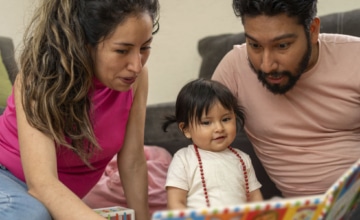Couples arrive at parenthood with different experiences and different expectations. Here’s how to reconcile those differences for more peaceful parenting.

“I grew up in a family where birthday girls were treated like celebrities. My sister’s July 4th birthday, and mine a few days before Halloween, made us think whole holidays were invented just for us. Not so in my husband’s family, where birthdays were mostly ignored. Pretty much a recipe for misunderstanding once we started celebrating together.”
What is coparenting?
Coparenting involves sharing the care of your child with the other parent, a grandparent, or someone else close to you. Most often, we use the term coparenting to describe the relationship that divorced or separated parents have with their children, but the term is increasingly used to describe the process of partnering around parenting—an experience shared by almost every family.
It’s likely that you and your coparent will have differences of opinion on the “best” way to be a parent. These differences can be over small things. How important is it that your child’s top and pants match? Do birthdays require a party with the whole class or only a cake with the family? Or big things. Will we treat sons and daughters differently? How will we manage challenging behavior? How do we show sadness and anger in our family and how will we teach the “right” way to do this?
Just as there are many ways to raise a healthy child, there are many different paths to supportive coparenting. Here are some approaches that may work for your family, allowing you to build a strong relationship with your coparent even when the going gets tough.

Get on the same page—literally.
Whether it’s an old-school wall calendar or a schedule-sharing app, families need something to keep track of events and determine how tasks and responsibilities will be split. Be sure to set aside time for fun too! Consider starting a tradition like family bedtime stories or Sunday sundaes that create time for connection in the midst of the day-to-day craziness.
Own the stuff you’re good at.
In one family we know, Dad seems to have an inexhaustible supply of patience. Both parents agree that he’s the most suited and most likely to deal effectively with their (very reactive) toddler’s frequent tantrums. In another family, Grandpa supervises the adventurous activities so Grandma isn’t gasping at every potential disaster. Remember to be flexible in who handles what. If a tough day has left you exhausted, don’t wait for your coparent to read your mind. Say something like, “I need you to take the next tantrum. Bad day.”
Avoid being the gatekeeper.
In our 2015 national survey of parents of young children, 43% of dads and 16% of moms said that their parenting partner often takes too much control of parenting. If you’ve appointed yourself Parent-in-Chief, talk about ways to split parenting tasks so you’re not always the one delegating and giving instructions. Also, think about what really matters to you and let the other details go. Is it most important that your child get to preschool on time? If yes, then maybe an occasional breakfast in the car isn’t such a big deal.
Whoever is doing it is doing it right.
Sharing child care means accepting that your coparent does things differently. If you find yourself “coaching” when your coparent is doing something or if you re-do what’s already been done (because it wasn’t done the way you would have done it), you may want to re-think. It’s easy to fall into this pattern, especially if you’ve taken the lead in the past. But remember, children can adapt to different caregiving styles. Giving your coparent and your child time to find their way helps them build their own unique bond. So when you feel like you’re about to burst with good advice, take a deep breath and a try one of our mindfulness tips.
Express gratitude, always.
Say thanks. Being a parent involves countless (exhausting!) daily decisions and tasks and having someone in your corner who has your back can make all the difference. Says a mom we know, “When our kids were little, we made a decision to notice each other more. So I would say, ‘Thanks for taking out the garbage,’ and he would say, ‘Thanks for doing the laundry.’ It’s such a little thing, but it feels good. I feel appreciated and I think he does too. Now that our kids are teens, I think it’s given them a good model for how to function as a family team.”





